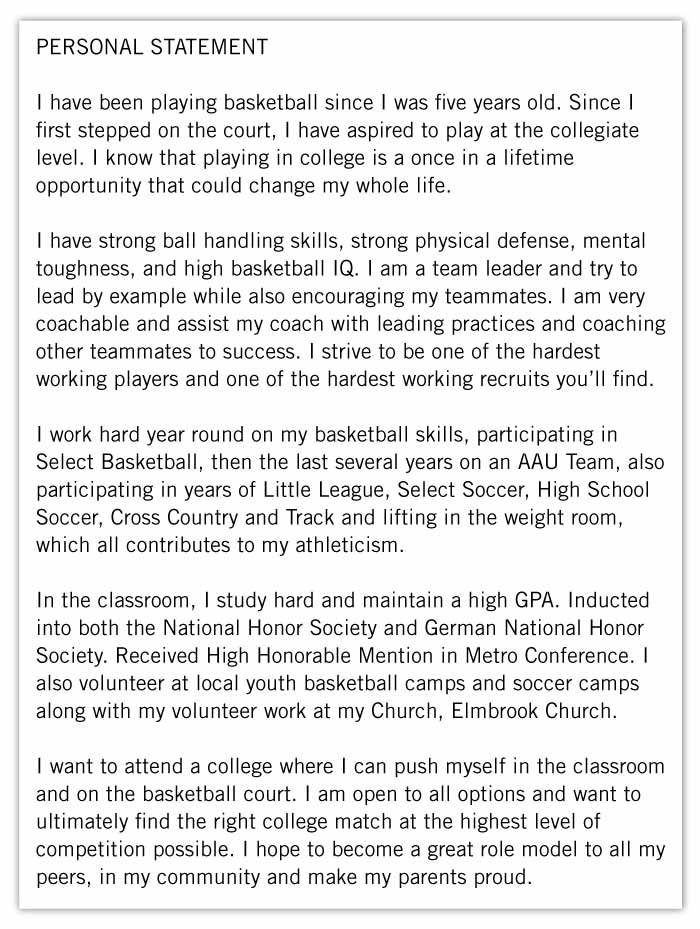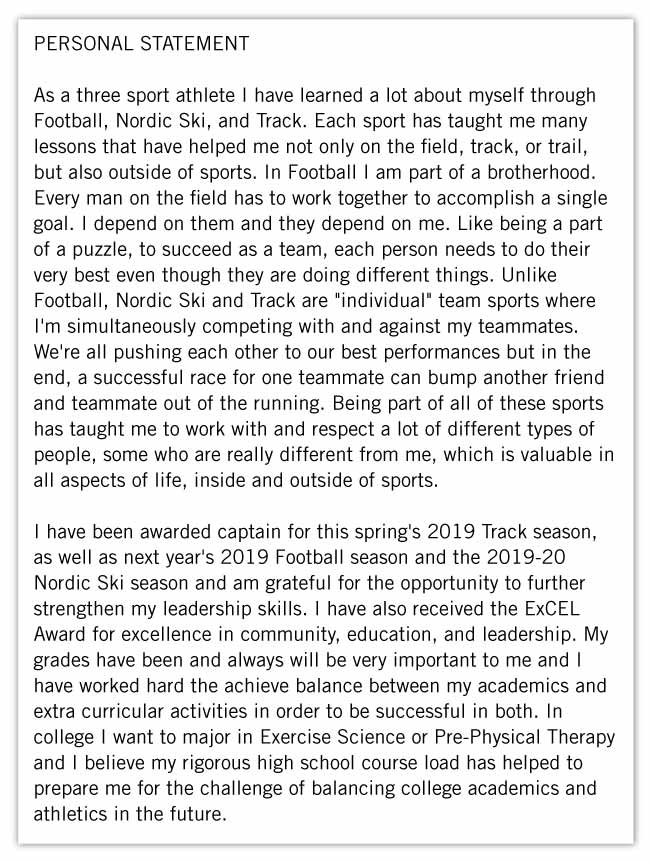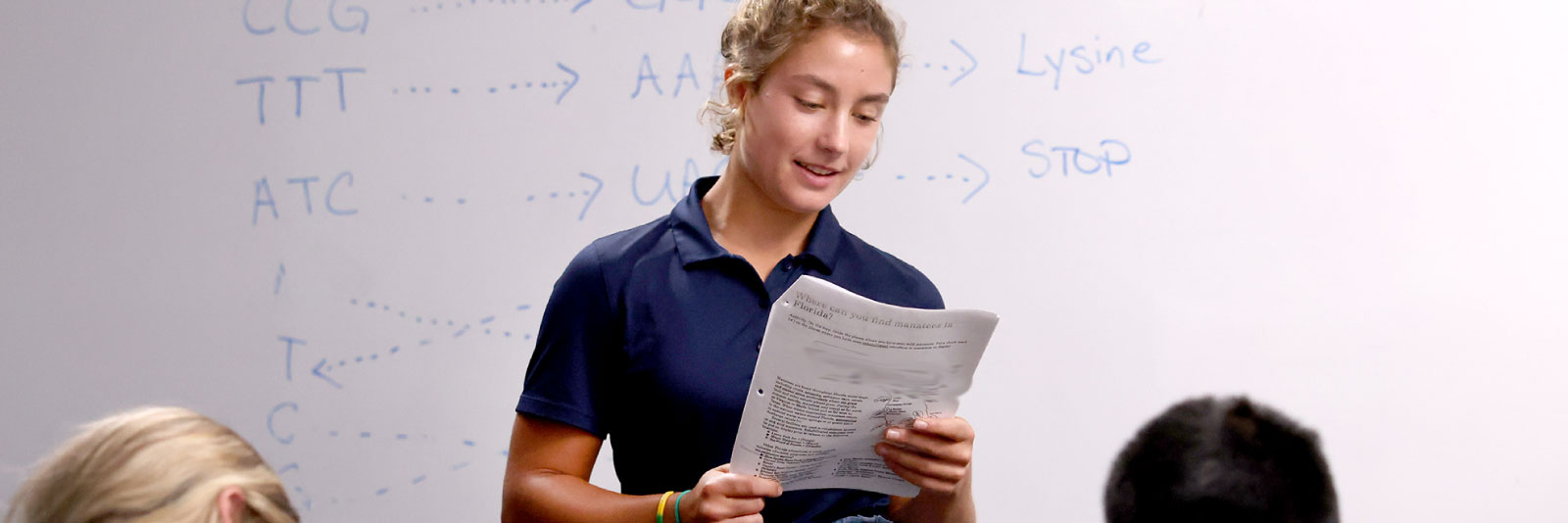What is a personal statement? A personal statement is your chance to show college coaches who you are outside of your academic and athletic life. It allows you to showcase your character, extracurricular activities and what makes you unique as a student-athlete.
This page will explain what a personal statement is, how it differs from an athlete bio and why it’s essential for your college recruiting process.
Including your personal statement in your NCSA athlete profile is crucial. It helps coaches get to know you better and provides a foundation for writing personalized emails to college coaches.
What is an NCSA profile? An NCSA profile is a personalized online profile that highlights your athletic achievements and connects you with college coaches to help you get recruited. Create your profile today and start your recruiting journey!
4 Steps to Writing a Personal Statement
Step 1: Be yourself
When writing your NCSA personal statement, be honest and be personal. There’s no need for formality, just focus on sharing what’s most important to you.
Talk about your accomplishments and be sure to mention what motivates you and excites you about your college path.
Step 2: Be specific
Being specific in your personal statement means answering questions like “So what?” and “Why me?” when describing what you bring to a college team.
This includes:
- Awards and accolades
- Academics (beyond what’s displayed in your NCSA profile)
- Challenges you’ve overcome
- Future goals
- Leadership roles
For example, think about these questions:
- What details of your life have influenced who you are?
- When and how did you become interested in your sport?
- What have you learned about yourself through playing your sport?
- What are your academic goals for high school? For college?
- Have you had to overcome any obstacles to get where you are?
- What unique characteristics or skills do you possess?
Being specific helps create a personal connection with college coaches, and ensures your personal statement is unique and memorable!
Step 3: Edit and proofread for spelling and grammar
Once the first draft of your personal statement is written, review it and focus on:
- Spelling and grammatical errors
- Specificity
- Relevancy
- Clarity with simple, concise language
- Active voice (rather than passive voice)
Insider Tip: Read your personal statement aloud to see how it flows. Also, ask a friend or family member to review it – they may catch things you missed! This is your chance to make a strong first impression, so give your full effort.
Step 4: Rework your opening sentence
Your opening sentence is your hook! So, make it count. It should be personal to you, not using any clichés or quotes. This is arguably the most important part of the statement.
NCSA Personal Statement Examples
Need a little inspiration for your NCSA personal statement? Check out these real examples from student-athletes who successfully used their personal statements to catch the eye of college coaches.
NCSA Personal Statement Examples
Need a little inspiration for your NCSA personal statement? Check out these real examples from student-athletes who successfully used their personal statements to catch the eye of college coaches.
Personal Statement for Women’s Basketball
Here is a personal statement from basketball player Laura Marx, hailing from Menomonee Falls, WI.

What makes Laura’s personal statement stand out?
- Goes beyond just talking about her skills, sharing her dedication to the sport, leadership roles and involvement in extracurricular activities, making her a well-rounded athlete.
- Ties her academic achievements into the statement, showing her commitment to excelling both on and off the court.
Keeps statements clear and concise, staying focused and on-topic.
Personal Statement for Men’s Football
Check out this personal statement from football player Cormac Shanoff of Little Falls, MN.

What makes Cormac’s personal statement stand out?
- Starts strong by mentioning his involvement in two other sports, showing his dedication and well-roundedness as an athlete.
- Keeps it personal and real, sharing life lessons he’s learned from playing on a team, like the value of teamwork and camaraderie.
Gets specific about his sports achievements, leadership experience and academic goals, adding more detail to his story.
How long should a personal statement be?
A personal statement typically ranges from 200 to 650 words. However, make sure to check any specific requirements from the college or program you’re applying to, as some might have different word count limits.
Does a personal statement matter?
Including a personal statement with your application is always a good idea, particularly if it’s a college you would really like to attend. If coaches are between two applications, a strong, well-written personal statement will help set you apart.
For student-athletes, meeting the college’s athletic standards is only the first step. Studies have shown that coaches place high importance on athletes’ character and coachability over pure athletic ability. Thus, demonstrating humility, patience, and willingness to learn is key when you are trying to stand out.
What is an athlete bio?
An athlete bio is a concise overview of your athletic background. While your personal statement dives deeper into your motivations, goals and personal story, your athlete bio gives coaches a quick snapshot of your athletic career. It highlights key details such as your sport, position, achievements and leadership roles. Both the personal statement and athlete bio are essential parts of your NCSA profile, but they serve different purposes.
How do you write a student-athlete bio?
To write a student-athlete bio, focus on the most important aspects of your athletic background, such as your sport, position, and key achievements that will stand out to coaches.
What’s a good bio for an athlete?
A good athlete bio should highlight your sport, position, top achievements, and leadership roles, offering coaches a quick, clear view of your qualifications.
Here’s a brief student-athlete athlete bio example:
- Jane Smith
- Soccer, Forward
- 3-year varsity player, 2x All-State, 50+ career goals
- Captain of high school team, 2024 MVP, Community volunteer for local youth soccer league
Get Recruited with more NCSA resources
Now that you’ve got a grasp on writing a sports-centric personal statement for college coaches, check out our College Recruiting Guide to dive more deeply into key areas of the recruiting process.
If you’re ready to build your free online athletic recruiting profile (including a personal statement) to tell coaches who you are, click here!
